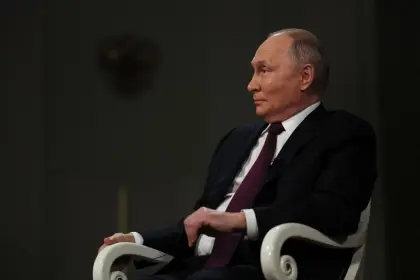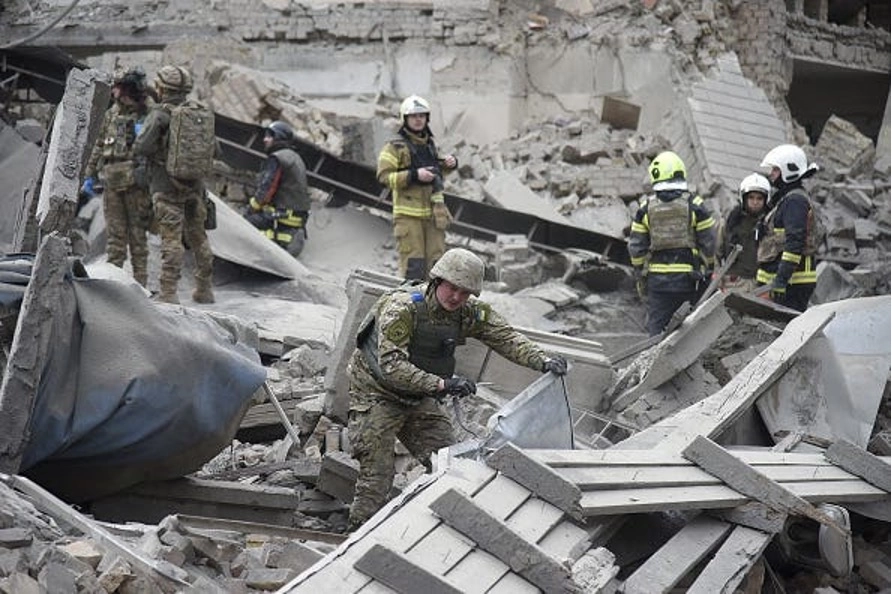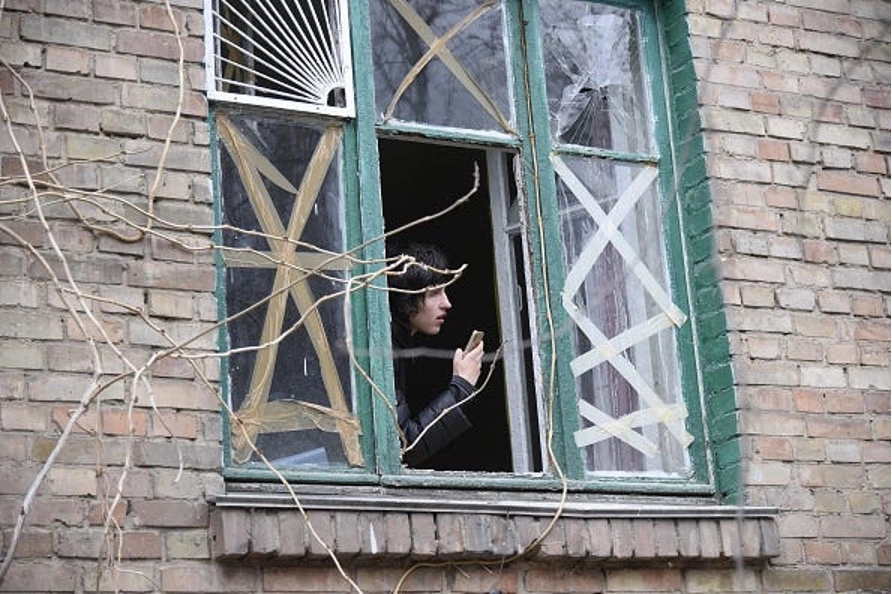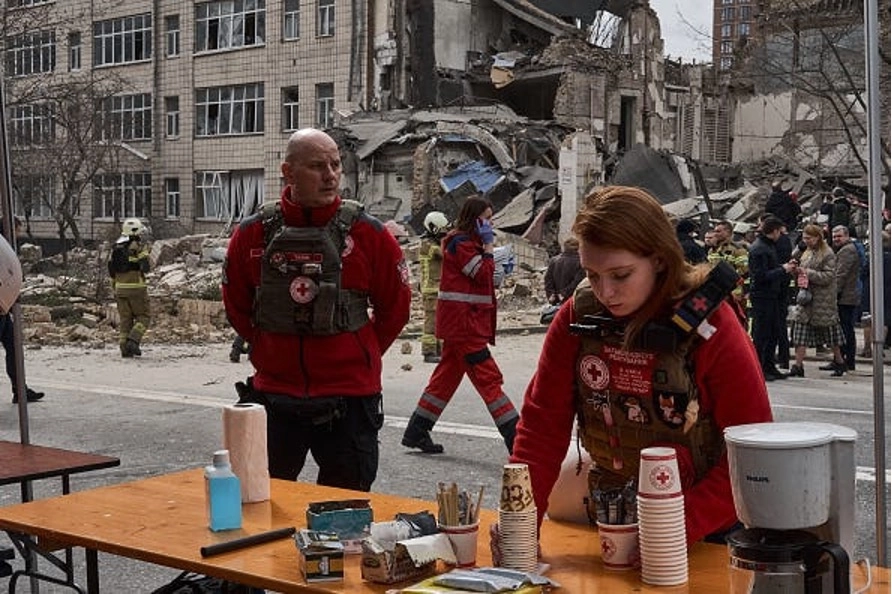On Friday, March 22, four men associated with Islamic State attacked civilians in a concert venue near Moscow known as Crocus City Hall. Islamic State (IS-K) claimed responsibility for the horrifying mass murder, and released videos recorded from the terrorists' perspective (don't watch them). Russia has since apprehended four men, who seem to be the perpetrators.
Russia has been engaged with Islamic State for some time. Russia has been bombing Syria since 2015. Russia and Islamic State compete throughout Africa for resources. All four of the accused are Tadjiks, a people subjected to discrimination inside Russia.
JOIN US ON TELEGRAM
Follow our coverage of the war on the @Kyivpost_official.
These are the facts, subject to further verification and interpretation – and inherently unpredictable, as facts always are. What was entirely predictable (and predicted) was that, regardless of the facts, Putin and his propagandists would place the blame for the attack on Ukraine and the United States. If Ukraine and the West are guilty, then Russian security services do not have to explain why they failed to stop Islamic terrorists from killing so many Russians, because Islamic terror vanishes from the story. And if Ukrainians are to blame, then this would seem to justify the war that Russia is prosecuting against Ukraine.

Over 100K Ukrainians Return to Russian-Occupied Donbas as Economic Hardship Grows
Aftermath of Russian ballistic missile strike on Kyiv, March 25.
Russian officials make a highly circumstantial argument: the terrorists’ car was stopped near Bryansk, which is in western Russia, and so vaguely near Ukraine, which means that the four Tadjiks in a Renault were intending to cross the Ukrainian border, which means that they had Ukrainian backers, which means that it was a Ukrainian operation, which means that the Americans were behind it. The reasoning here leaves something to be desired. And the series of associations rests on no factual basis.
The suspects were in a car near the west Russian city of Bryansk. This much seems to be true. The first version of the story was that they were headed for Belarus, which would make more sense, given the route. Anyone with local knowledge would make a still more telling point. Because of the special relationship between Russia and Belarus, the Russian-Belarusian border is porous. Once inside Belarus, it is relatively easy to pass into the European Union, because the Belarusian regime enables human smuggling into Lithuania and Poland. Four Tadjiks in a Renault would have been, in this sense, welcome in Belarus. They would have had a decent chance to pay a smuggler to get them into the Schengen zone and thereby escape.
The idea that the suspects were headed for Ukraine seems to be entirely invented and is extremely implausible. As of this writing, none of the suspects seem to have said anything about Ukraine, despite the fact that they have been tortured, presumably with such a confession in mind. And the notion of a Ukrainian escape route really makes no sense. The Russian-Ukrainian border is a place where Russian security forces are concentrated. It is a site of combat. It is the last place terrorists would want to go. Four Tadjiks in a Renault would have needed some very, very high-level Russian protection to get anywhere near the Russian-Ukrainian border.
Russian propagandists have told the population that it was not Islamic State but Ukraine who is to blame. ISIS is just a “fake.” The propagandists need not give reasons, and don't. Only Putin is permitted to set the theoretical tone for the argument for Ukrainian involvement, and on Monday, March 25, he gave that a shot. His version went like this: Ukrainians are Nazis. Nazis do bad things. A bad thing happened. Therefore, Ukraine is to blame.
One does not have to be a logician to find the holes. They are disturbingly large.
The premises do not work together. While it is true that Nazis do bad things, it does not follow that all bad things are done by Nazis. And the first premise is empirically false.
One should not have to say this at this point of the war, but the Ukrainians are not the Nazis in this conflict. The Ukrainian far right has never done well in elections, and is far less prominent than in any European state you care to name, let alone the United States. Ukrainians have an active civil society, a vibrant press, multiple political parties, and freedom of speech. Ukraine’s president won a free and fair election. He is also, incidentally, Jewish. The Ukrainian minister of defense, for that matter, is a Muslim. The commander-in-chief of the Ukrainian armed forces was born in Russia, where his parents still reside. This kind of political and social pluralism is unusual by any standards.
A Kyivan looks out the window after the March 25 Russian ballistic missile strike.
In Putin's version of the Russian language, of course, the word “Nazi” has no meaning beyond “what I wish for you to consider as the enemy.” If we are going to pursue the question of who the fascists in this war are, however, it is worth knowing that Russia has none of what Ukraine has. Putin has never won anything like a plausible election to any office. His regime has crushed civil society, political parties (except his own), and the press. Putin runs a single-party state where the only principle of the single party is his personal status as its Leader. He rules at home by terror and prosecutes a genocidal war abroad, in Ukraine, with the help of Russian soldiers who ever more often openly identify as fascists. Putin himself espouses what is unmistakably a fascist ideology.
Calling the Ukrainians the Nazis while being the Nazis is not itself a problem within this system, since being the fascists involves living within a big lie. The challenge to such a system is that reality sometimes intervenes in a way that is hard to control – as when Islamic State carries out an act of terror. This brings in a whole set of political and social realities that are usually suppressed in Russian propaganda: the bombing of Syrian civilians since 2015, the bloody resource wars in Africa, the oppression of Tadjiks.
In Russia's system, it is not simply political convenience that adds the big lie of Ukrainian jihadism to the big lie of Ukrainian Nazism. It is the deeper need to make reality, or at least psychological reality, conform to the story told by the state. In the psychological project, more killing is necessary. Russians are engaged in the project of killing Ukrainians. Russians in Ukraine torture Ukrainians for being loyal to Ukraine, deport Ukrainian children for assimilation to Russia, and persecute and execute local elites who they regard as threats. Russians fire some combination of shells, glide bombs, drones, cruise missiles, and ballistic missiles at Ukraine every single day, for no reason that communicates with reality. Yesterday, for example, multiple Ukrainian cities were struck by 57 Russian missiles and drones.
It is the killing itself that makes the lies true, in a psychological sense. Russian soldiers who have killed Ukrainians believe they are fighting “Nazis,” whatever that means. And now Russian soldiers write “for Crocus” on the shells they fire at Ukrainians. On Monday, March 25, Russia fired two ballistic missiles at central Kyiv, even as Russian authorities announced that the terrorist attack means that they are permitted to kill high officials of the Ukrainian state.
Rescue workers prepare to help victims after a Russian ballistic missile hit the Kyiv Academy of Decorative and Applied Arts and Design. Photo by Kostiantyn Liberov/Libkos/Getty Images)
Among Ukrainians, all of this generates a weary shrug. It has been a kind of Western parlor game these last two years to ascertain the “rational” motivations behind Russia's war of atrocity in Ukraine. Such a debate is attractive in the West, because if one can identify a Russian rationality one can then defend a policy of doing less, or doing nothing, to help Ukraine win the war. If Russia is rational, then surely some compromise can be found. This is a Russian leadership, however, that interprets the fact of American warnings about the attack as a reason to blame the United States for it: as the puppetmaster of Ukraine, which is itself the puppetmaster of Islamic State.
For Ukrainians, being identified as Islamists as well as Nazis is just one more detail in what is for them a war of self-defense and survival. And of course, as Ukrainians will remind you, for different audiences the Kremlin also characterizes Ukraine as the center of gay civilization, as an element of the Jewish international conspiracy, and as a Satanist cult. So (the memes are out there) Ukraine is now a gay Jewish Nazi Islamist Satanist regime.
The Kremlin goal of identifying Ukrainians as terrorists might matter in the war. It can be used as an excuse to continue, to mobilize, to commit new kinds of war crimes. This is one way this will certainly go. But it is not certain that this development will be stable.
It might matter to Russians that Putin’s big lie about Ukraine is growing whiskers. Once forced into gay-Nazi-Jewish-Islamist-Satanist territory, Russians just might be reminded of the late Stalinist purges directed against supposed Zionist-Trotskyite-fascist-imperialist (etc.) conspiracies. Or, more simply, people inside the regime, backed into a corner by Putin's escalation of unreality, might just realize that the Ukrainian scenario makes no logistical sense, and lacks any evidentiary basis.
This can undermine Putin's authority, and the sense that his story is a useful one. Judging by yesterday's appearance, this is no longer the nimble post-truth Putin who is capable of changing out one lie for another as necessary, with a wink to the insider along the way. This now seems to be a Putin who actually believes what he says – or, in the best case, lacks the creativity to react to events in the world. His speech yesterday was grim for everyone, including to Russians who would like to think that their leader is ahead of events.
Putin's Ukrainian theory could make Russia more vulnerable to terrorism. The Crocus City Hall attack was more likely because Putin has chosen to use his security apparatus against Ukraine and the opposition. It is typical of his priorities that, on the very day of the Crocus City Hall attack, the regime defined international LGBT organizations as “terrorist.” When Putin publicly ridiculed the United States on March 19 for warning of an Islamic State attack, he was signaling to the security apparatus that this was not a real danger. In conflating Islamic State with Ukraine now, he is doing the same thing at a higher level. That cannot be helpful in the practical work of preventing another attack.
Nor can, surely, Putin’s idea that Islamic State takes orders from the Jewish president of a European state, and that its actors are nothing more than pawns of American masters. I am not going to claim any expert knowledge of how Islamic State works or its leaders think, but it seems like it would not be best practice to ignore it and insult it at the same time.
Reprinted from the author’s blog: “Thinking about…” See the original here.
The views expressed in this opinion article are the author’s and not necessarily those of Kyiv Post.
You can also highlight the text and press Ctrl + Enter









